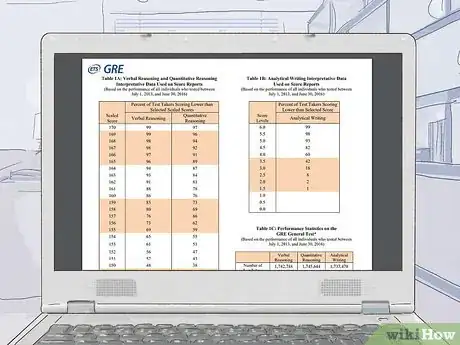This article was co-authored by Bryce Warwick, JD. Bryce Warwick is currently the President of Warwick Strategies, an organization based in the San Francisco Bay Area offering premium, personalized private tutoring for the GMAT, LSAT and GRE. Bryce has a JD from the George Washington University Law School.
This article has been viewed 29,591 times.
The Graduate Records Examination (GRE) is a test that you may need to take to apply to certain graduate schools or post-secondary programs. A high score on the GRE can also help to boost your school applications and increase your chances of getting into a competitive program. Studying for the GREs can be a feat in itself, but once you take the test, you can check your scores within 10-15 days, or 5 weeks. Once you have your GRE scores, look them over to see how well you did and determine whether you need to take the test again.
Steps
Checking GRE Scores In Person or Online
-
1Choose to view an unofficial report of part of the GRE test at the test center. When you finish taking the test in person at a test center, you will be given the option to Report or View your scores. You can then view your unofficial scores for the Verbal Reasoning and Quantitative Reasoning section of the test. You cannot view your Analytical Writing score at the test center.[1]
- These scores are unofficial and just for 2 sections so they may not give you an accurate sense of how you did on the GREs overall. But they can give you an impression of how you did on 2 sections.
EXPERT TIPBryce Warwick is currently the President of Warwick Strategies, an organization based in the San Francisco Bay Area offering premium, personalized private tutoring for the GMAT, LSAT and GRE. Bryce has a JD from the George Washington University Law School.Test Prep Tutor, Warwick Strategies
 Bryce Warwick, JD
Bryce Warwick, JD
Test Prep Tutor, Warwick StrategiesOur Expert Agrees: Directly after your test, you're given the option to cancel your scores. If you choose not to cancel them, you'll know immediately what your quant and verbal scores are. You won't know how you did on your essays until a couple of weeks later.
-
2Create an online account on ETS.org to get your official scores. You can create a free account here: https://ereg.ets.org/ereg/public/signin. You will need to provide basic personal information like your name, mailing address, and phone number. You will also need to create a username and password for your account.
- Have an online ETS account will allow you to check your GRE scores, receive updates about the GRE, and keep track of the status of your GRE scores.
Advertisement -
3Check 10-15 days after your test date if you took a computer-delivered test. You will receive an email notifying you that your complete GRE scores are available through your ETS account.[2]
- The computer-delivered test tends to be processed faster than a paper-delivered test.
-
4Look for your scores 5 weeks after your test date if you took a paper-delivered test. You should receive an email notification when your GRE scores are available. You can then log into your ETS account for your official GRE scores.[3]
-
5Print a hard copy of your scores through your ETS account. If you want a physical copy of your scores, log into your ETS account and print them off free of charge. Having a physical copy can make it easier for you to analyze your scores.[4]
- A hard copy of your official scores will also be sent to the score recipients you listed, such as graduate schools or programs, when you registered for the GRE.
Interpreting GRE Scores
-
1Look at your scores for each section of the GRE. Your official GRE scores will be broken into 3 sections, Verbal Reasoning, Quantitative Reasoning, and Analytical Writing. You can receive a range of 130-170 points in Verbal Reasoning and Quantitative Reasoning. Analytical Writing is scored on a 0-6 range in half point increments.[5]
- For example, you may score 150 in Verbal Reasoning and Quantitative Reasoning, and score 4.5 on Analytical Writing.
-
2Notice if you scored within top 10-25% for Verbal Reasoning and Quantitative Reasoning. The GRE scores for Verbal Reasoning and Quantitative Reasoning will be calculated based on a scaled score and a percentile score. Your percentile score is more important, as it shows how you scored within the pool of other test takes. Scoring within the top 10-25% is considered a good score.
- You can view the most recent GRE percentile rankings here: https://www.ets.org/s/gre/pdf/gre_guide_table1a.pdf.
-
3Look at the corresponding percentile for your Analytical Writing score. Check the total number of points you received on the Analytical Writing section and then look at the corresponding percentile to determine how well you did. A chart of corresponding percentiles can be found here: https://www.ets.org/s/gre/pdf/gre_guide_table1a.pdf.[6]
- In general, a point score of 5 or higher on the Analytical Writing section is considered good, as that means you scored within the 93 percentile.
-
4Consider taking the GRE again to improve your scores. Look at well you did in each section and consider if you could improve your score in 1 or all sections. You should also consult the scoring requirements for the graduate applications or programs you are applying for. You may need a higher score in certain sections or overall to get into competitive programs.[7]
- You may try doing a study course for the GRE to improve your scores or focus on getting better in certain sections to increase your score.
References
- ↑ https://www.ets.org/gre/revised_general/scores/get/
- ↑ https://www.ets.org/gre/revised_general/scores/get/
- ↑ https://www.ets.org/gre/revised_general/scores/get/
- ↑ https://www.ets.org/gre/revised_general/scores/get/
- ↑ https://www.princetonreview.com/grad-school-advice/good-gre-scores
- ↑ https://www.princetonreview.com/grad-school-advice/good-gre-scores
- ↑ https://www.princetonreview.com/grad-school-advice/good-gre-scores



































































